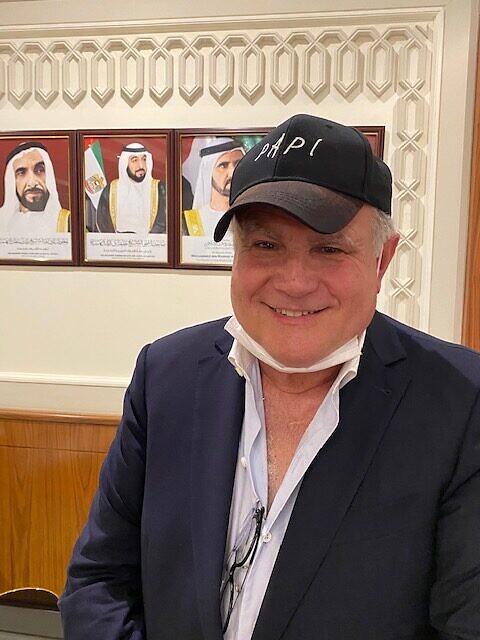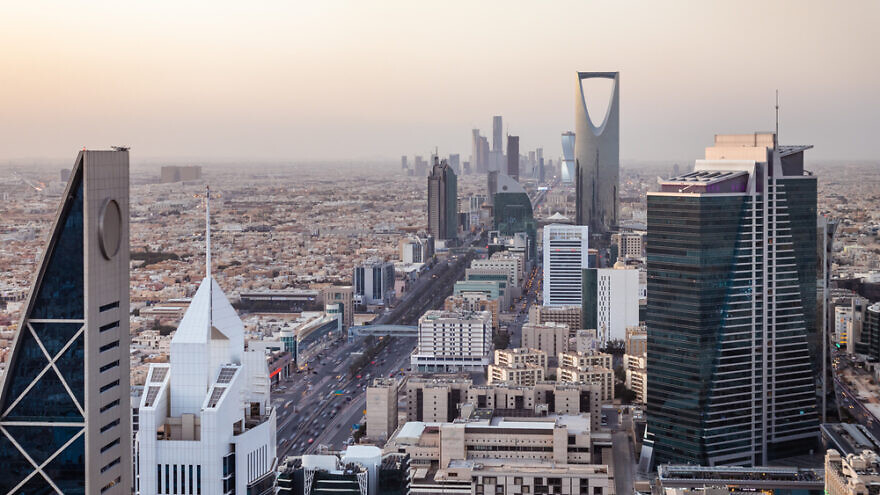Earlier this month, it was revealed that a group of 15 Republican Jewish leaders from the United States paid a visit to the Kingdom of Saudi Arabia in June to try to advance the Abraham Accords normalization deal between the United States, Israel and the Gulf states.
The private initiative allowed the group to meet with top Saudi governmental officials, as well as members of the Saudi royal family, in a push for peace.
Phil Rosen, a New York-based attorney and Republican Jewish Coalition (RJC) board of directors member, and also a vice chair of the Birthright Israel Foundation, explained to JNS that due to certain sensitivities between the Biden administration and the Saudis at the time, the trip could only be revealed now, several months later.
When arriving in Saudi Arabia, Rosen, who has traveled to the kingdom in the past, said he noticed how much progress had taken place over the past few years in terms of the country’s Westernization. He noted that tremendous strides had been made in terms of religious rights and women’s rights.
He shared that “in 1993, at the request of Shimon Peres”—Israel’s foreign minister at the time—“I was asked to see if the Arab countries, and Saudi Arabia, in particular, were interested in peace.”

Rosen said that he came back from Saudi Arabia with great trepidation, telling Peres that peace wouldn’t happen for at least a century or two.
“But today,” he reported, “I have a strong feeling that we are on the verge of something big happening. It’s definitely viable.”
Rosen said he is “giving the current U.S. administration a chance to prove they want it. They know it’s good for us as Americans, and definitely good for Israel and Saudi Arabia. There is no reason not to do it. It could mean a lifetime of peace between Israel and the Arab world.”
‘They need technology, they need irrigation’
Eric Levine, also an attorney from New York and an RJC board member who was on the trip, told JNS that in Saudi Arabia, “everything we were hearing was not ‘if,’ but ‘when’ peace will happen with the Israelis. That’s clearly the message I took away.”
“Look at everything happening here. When we traveled to the UAE, we flew over Saudi airspace. As a Jew, if you would have told me five years ago that we could fly over Saudi airspace, I would say you were out of your mind,” continued Levine.
He said “if a UAE to Haifa train line is built, it will have to go through Saudi territory; and if there is technological infrastructure between the Gulf and Israel, it will have to go through Saudi territory. Countries have interests, they don’t necessarily have friends, and the Saudis have come to the conclusion that it is in their national interests to make peace with the Israelis.”
At the same time, Levine said that normalization with Israel makes sense for the Saudis from a demographic perspective as 70 percent of its population is under the age of 35, and they realize how important a modernized Westernized education system is for the next generation.
Levine believes they now realize that “the Wahhabi way of thinking in these madrasas [educational institutions] has to stop.”
He said, “As they told us, they recognized they have to close these madrasas. Rather than teaching ‘Kill the infidel,’ ‘Kill the Jew,’ ‘Destroy America,’ they are now teaching them math, science, philosophy, Western liberal thought and bringing them into the 21st century.”
“The only country that they can turn to that can help them do that is Israel. They need the technology; they need to be able to make the desert bloom; they need irrigation; they want to diversify into 5G, etc. What better place to get that technology than right in their backyard, with Israel?”
On the security front, Levine said the “Saudis were clear to us that the three greatest threats to them are Iran, the Muslim Brotherhood and Turkey, in addition to Yemen.”
He reported that the Saudis question why the United States doesn’t view the Houthis in Yemen—the Iranian proxy that has been launching rocket attacks at Saudi Arabia—as a terror group similar to Hezbollah in Lebanon.
Levine said that in general, the Saudis are not confident in support from the Biden administration; they have more faith in Israel. “Based on what I heard, the assessment is that they believe that the United States does not have their back and that if push comes to shove, Biden would let the Iranians swallow them up. And the only country in the world that’s going to come to their defense is Israel,” he said.
Rosen noted that he plans to travel back to Saudi Arabia with another group in January “to show them this wasn’t a one-time thing.”
“Politicians will tell you they have no idea when peace will come with the Saudis,” he said, “but those who can ignore the political ramifications, like myself, are both optimistic and anxious for peace.”


























